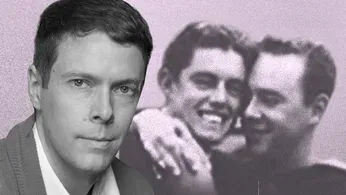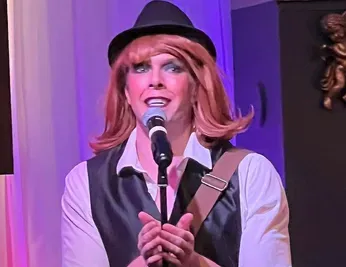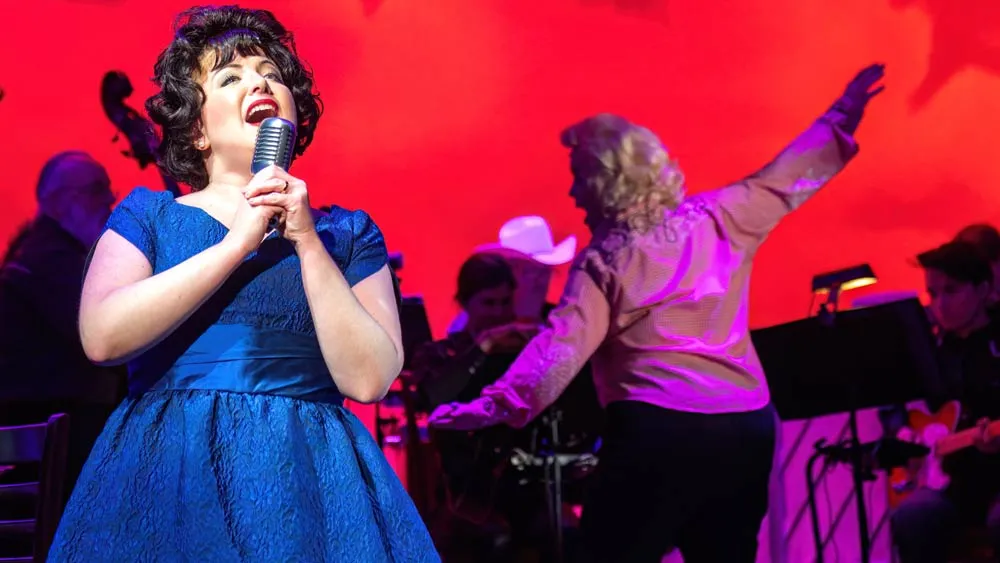
Jun 9
Cabaret's Francis Garner Mixes Queer Past and Present in 'Miss Otis Regrets'
John Amodeo READ TIME: 6 MIN.
A few years ago, Francis Garner, a handsome thirty-something man, showed up at CabaretFest in Provincetown for the first time. He knew no one, but gained the attention of the entire room with what New York critic Bart Greenberg later described as his "powerful baritone and arresting personality."
A student of opera most of his life, Garner had not previously ventured into cabaret territory; nonetheless, he sang titles from the Great American Songbook or from pop music with a deeper connection to the lyrics than those who made the song famous, and he realized he had found an art form and a community that held promise for him.
Garner has since used The Club Cafe's Napoleon Room and CabaretFest Provincetown as training grounds to launch two theatrical, scripted, performance art-styled cabaret shows. First, "Over the Hill: Dating Gay Over 30," the autobiographical tale of his dating foibles that he brought to Manhattan's Don't Tell Mama last year, where it received quite favorable reviews, including one from Greenberg, who called it "wryly humorous."
His second show, "Miss Otis Regrets," which made its debut at last year's CabaretFest, has been expanded into a full hour-long theater piece. In it, Garner mixes story and song, and fact and fiction. In the first half, he tells of a tragic coming-of-age gay romance from the 1950s; in the second, he relates his own journey toward self-awareness and fulfillment as a gay man. Just in time for Pride celebrations, Garner will present "Miss Otis Regrets" on Sunday, June 8 at the Post Office Café & Cabaret, Provincetown, and again on June 14-15 (8 pm and 7 pm, respectively) at The Dance Complex in Cambridge.
Growing up on the edge of Sandwich, MA, a small village on Cape Cod, Garner's upbringing was fairly conservative. This had a profound impact on him, and made it more difficult for him to live his authentic life as a gay man during his own coming of age. "One line that I've only recently added into the show, after citing that Massachusetts is the first state in the union to legalize same sex marriage, was the commentary from the conservative people in my social circles," begins Garner. He added that though "born and raised in royal blue MA," he never felt safe to express his sexuality and was "forced out of the closet at 21 or 22."

Source: Francis Garner
Now, ten years later, having gained the kind of perspective and insight that comes with life experience, Garner has put his operatic theater training to good use and written what is almost a miniature opera condensed into little more than an hour. Having experienced a somewhat repressive youth, Garner identified with a true story from the 1950s that inspired the fictional tale of Carl Otis, which Garner speaks and sings about in the opening of "Miss Otis Regrets."
"All of the events in the first half of the show are about a character named Carl Otis, [and they] are informed by what I've come to know as the Lavender Scare [enforced through Eisenhower's Executive Order 10450], which was the Federal Government's order to purge all LGBTQ+ people from the civilian and military federal workforce due to a perceived security risk they posed. [It was] much like the Red Scare to rid government of communists, but more likely due to a prejudice against gays and lesbians," notes Garner.
Carl Otis, Garner notes, takes his first name from a real postal worker, Carl Rizzi, who worked in Washington DC. "The real Carl didn't lose his job," recalls Garner, "but he was investigated by the Civil Service Commission, who held up a picture of him in a dress and asked, 'Is that you?,' to which he replied, 'That's a terrible picture. If you want a better picture for your files, I can get you one.'"
Eisenhower's Executive Order of 1953 lasted 20 years, until the U.S. Supreme Court ruled in 1973 that homosexuality alone was not a reason for dismissal, and the Senate Committee investigating homosexuality in the federal government was disbanded shortly after. However, discrimination in the federal government persisted. "10450's repeal later led to the Clinton era's 'Don't Ask Don't Tell,'" laments Garner. "It shows how one individual with power can have an impact on the makeup of the government workforce, such as the current banning of transgender people from the workforce."
Garner tells the tragic tale of the fictional Carl Otis and his clandestine lover, Billy, using mostly songs written before 1960 by LGBTQ+ songwriters, including Cole Porter, who wrote the song "Miss Otis Regrets" from which Garner takes the last name of his protagonist. (To reveal the song's content would be a spoiler.) He also makes dramatic use of a song by gay lyricist Lorenz Hart with "I'll Tell the Man on the Street" (music by Richard Rodgers). "I get to the part in the story where Billy ratted out Carl. That instigated the investigation that led to Carl's being fired," notes Garner. "This led to the sinister arrangement that I asked [musical director] Andy Lantz to come up with, turning a love song into a song of betrayal." He also includes the song "By Myself" (by the team of Arthur Schwartz and Howard Dietz), who weren't gay; the song, Garner explains, is largely known through Judy Garland's recordings of it, which makes it gay-adjacent.

Source: Francis Garner
After Garner performed this first half at CabaretFest two years ago, he knew if he expanded it, he would need to balance its dark edges with something lighter, but also more personal. Shifting into an autobiographical storyline in the expanded second half, Garner parallels Carl's plight with his own conservative upbringing, using songs primarily written after 1975, from such gifted songwriters as Billy Joel, Barry Mann, Sara Bareilles, and Stephen Schwartz. "New York State of Mind" is Joel's bluesy love song to New York, but Garner uses it illustrate his own incompatibility with city life. "The bluesy style gives the darker shading that may not have been intended by Billy Joel, but works for my story as written," quips Garner. "He did a nice job for me."
Garner peppers his show with brief interruptions to present commercials, unintentionally humorous, from the contrasting eras, from the Soda Pop Board of America and cold cream to Blu Electronic Cigarettes and cryptocurrency, chosen not just for their humor, but for the mirror they hold up to our culture then and now, reflecting in our deeply entrenched biases a cultural conservatism. "These commercials are verbatim from the 1950s and more recent times, as well," muses Garner. "My goal with that – and my hope that the audience picks up on this – is to elicit a reaction from the audience that, 'OMG, was that really acceptable to say at that time?' It doesn't directly propel Carl's and my story in the second half as much as it is [meant] to show how far we've come, and yet how little we've progressed."
Garner may have found that much of his early life and young adulthood was held in common with Carl Otis, but, unlike his fictional character, Garner's love story doesn't end tragically. Having met his boyfriend, Marcos, a little over a year ago, they now live together in Wareham, MA in a house he rents from his sister and brother-in-law, who live on the other side of their common party wall.
"I hope to buy my own house here, but probably not on my waiter's wages," sighs Garner. Still, Garner uses the second half of his show to point to progress not only in his own life, but also society in general. "I can only image what it must be like for the gay youth of today, when we seem to be backpedaling," bemoans Garner. "Public consensus, however, is also shifting in our favor, and though government is currently regressive, it's impossible to say how today's climate and favorable public attitude toward the LGBTQ community might help overcome that."
Francis Garner performs "Miss Otis Regrets" on Saturday, June 14, 8 PM and Sunday, June 15, 7 PM at The Dance Complex, 536 Massachusetts Avenue, Cambridge. Tickets: $25. Purchase tickets by visiting: Miss Otis Regrets - The Dance Complex for June 14 and June 15.
Garner brings "Miss Otis Regrets" to New York City on Sunday, July 20. For more details, follow this link.
John Amodeo is a free lance writer living in the Boston streetcar suburb of Dorchester with his husband of 23 years. He has covered cabaret for Bay Windows and Theatermania.com, and is the Boston correspondent for Cabaret Scenes Magazine.







